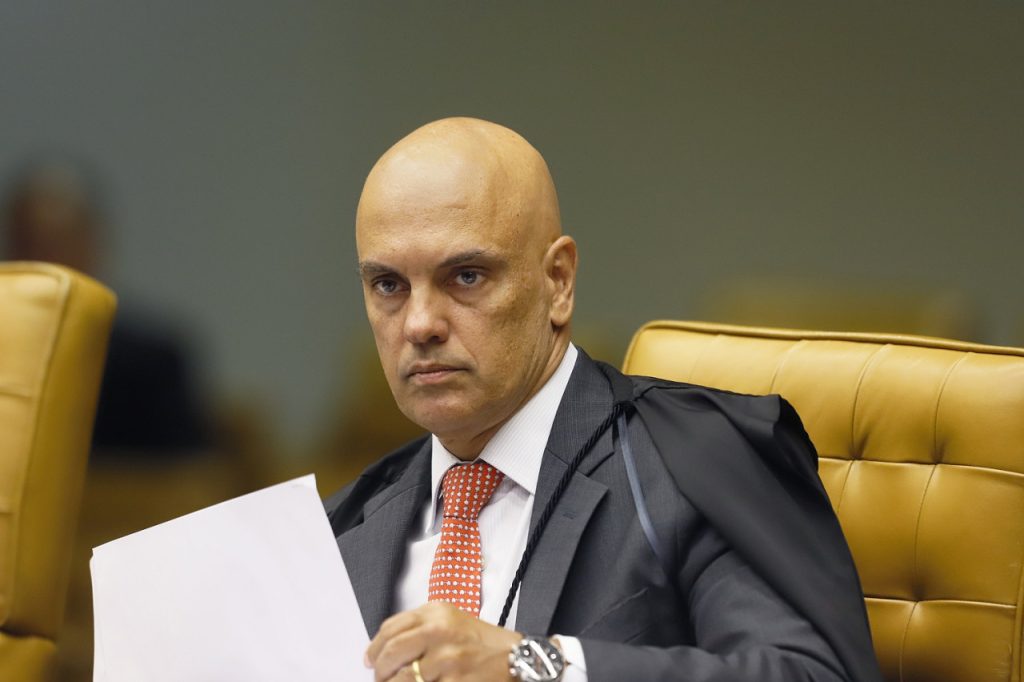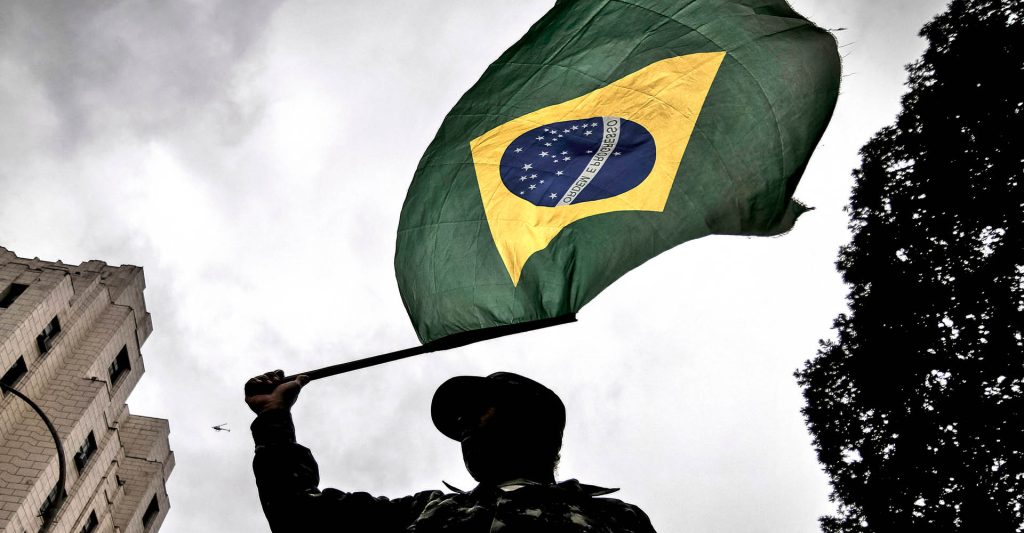“The spirits I summoned, now I cannot escape myself.”
Johann Wolfgang von Goethe in The Sorcerer’s Apprentice
Alexandre de Moraes maintains the High Electoral Courts, the TSE, extraordinary superpower even after the elections, continues to persecute the conservatives and makes it known that it will not stop.
At the same time, Brazil is experiencing a veritable popular uprising, with millions of citizens taking to the streets and protesting in hundreds of cities every day.
They are protesting against Alexandre de Moraes and his superpowers, against censorship, against the restriction of freedom and, above all, for a neutrally supervised audit of the elections.
But let’s start from the beginning.

On October 20, ten days before the second round of elections, the president of the Supreme Electoral Court (TSE), Alexandre de Moraes, approved a resolution giving the Court imperial powers until the election results are announced.
Since that day, the Court decided what could and could not be published on social networks, under the threat of removing the content without the right of defense and handing over the case to the Federal Police.
The date marks the return of censorship in the country, which had been lifted since the end of the military regime in the 1980s.
During the voting, the embarrassed voice of judge Cármen Lúcia drew attention. She accepted the motion of no confidence proposed by Alexandre de Moraes, but admitted that this could be a step into the “unknown”.
“This is a special case and we are ready to go to the second round of elections,” she said.
“The proposed freeze will be in effect until October 31, so as not to compromise voter safety and electoral freedom.”
“However, if it turns out that this leads to censorship, this decision should be reviewed immediately.”
The elections ended on the evening of October 31. But the censorship from the pen of Alexandre de Moraes did not stop, but rather intensified.
In the past two weeks, the social media accounts of at least seven lawmakers allied with President Jair Bolsonaro and journalists and digital influencers have been blocked.
One of the strangest cases was that of the economist Marcos Cintra, former finance minister and opponent of the president in the elections.
He was the deputy candidate on Soraya Thronicke’s list. Cintra lost his Twitter account and had to make a statement to the federal police.
What crime was committed?
Cintra questioned why some polling stations in Roraima and São Paulo did not register votes for Bolsonaro in the second round.
Harvard PhD student and vice president of the Getulio Vargas Foundation (FGV) said TSE owes “compelling explanations.”
He did not question the legitimacy of the election, nor did he encourage demonstrators to protest the election results.
THE KAFKAESQUE PROCESS
Moraes’ monocratic decisions are confidential, that is, secret. They don’t have to make excuses. He censors as he sees fit and Brazil has to swallow it.
I am the law.
Censored persons undergo a Kafkaesque process – they do not know what they are accused of, let alone what they must do to escape the cycle.
The only communication comes from the platforms where it is said that the accounts have been “held” by order of the Tirana Stock Exchange.
“We can’t provide more information about the process or give legal advice, but you can contact an attorney for that purpose,” Twitter said.
“He just asked a legitimate question,” said Roberto Delmanto Junior, Cintra’s lawyer.
“Every citizen has the right to ask a question to the authorities. I am fully convinced that there was no crime.”
The judge, Alexandre de Moraes, justifies his decision by saying that it would have been an attack on the Tirana Stock Exchange and that this could constitute a crime against the democratic legal state and an electoral crime.



However, these do not exist because the elections are already over.
Moraes argues that there is an orchestrated movement behind the popular demonstrations that have spread since the election results.
He has called protests outside army barracks across the country undemocratic – which falls into the realm of legal perversion that the ongoing Supreme Court inquiry into Fake News has become.
However, since neither Alexandre de Moraes nor the police intelligence services (civilian, military and highway police) have identified the drivers on the road, the option has been to silence the profiles of those who comment on the issue on social networks.
The rule is that anyone who questions the electoral process or recognizes the legitimacy of the barracks protests will be treated as a criminal.
“Those who criminally do not accept the election result, those who criminally commit anti-democratic acts will be treated as criminals,” Moraes said last week.
On Friday, November 11, the commanders of the Navy, Army and Air Force issued a public communication defending the guarantee of peaceful demonstrations and condemning the “restriction of rights by state agencies” and “excesses” in actions across the country “that can limit individual and collective rights or endanger public safety”.
The document addressed to the “Brazilian institutions and people” is a clear message to the Federal Supreme Court and the Supreme Electoral Court.
Without naming names, the letter states that the role of the armed forces is essential to guarantee the rights enshrined in the Constitution, including freedom of thought and assembly and the right to come and go.
As far as the legislature is concerned, the text states that the House of the People is the natural recipient of the wishes and demands of the people, “in whose name it legislates and acts, always seeking to correct possible arbitrariness or autocratic errors that may endanger the highest good of our society. society, namely its freedom.
REACTIONS AGAINST THE DASHING OF THE NEWS
However, the National Congress has never so cowardly and silently accepted the persecution and imprisonment of MPs.
Faced with the silence of Senate President Rodrigo Pacheco (PSD-MG), some parliamentarians are pushing for a vote on bill 371/2022, which could ban the TSE’s superpowers.
The group is led by gaucho senator Lasier Martins (Podemos).
“In Brazil, there continues to be notorious censorship in various forms, whether it’s on the posts or the profiles of people blocked. There is a climate of intimidation, threat and fear. The risks of being punished by the authority that today acts as an emperor in Brazil: Minister Alexandre de Moraes” (Lasier Martins)
Martins is the author of one of the petitions for the impeachment of Alexandre de Moraes, which always have the same goal: the impeachment of the Pacheco cabinet.
In the plenary session, today (8) requested an action against the arbitrary measures of #TSE that created a climate of censorship, defying constitutional provisions. I asked for my vote for PDL371/2022, which suspends the resolution that gave the Tirana Stock Exchange extraordinary powers during the election period. pic.twitter.com/YMlZxdPeiK
— Lasier Martins (@lasiermartins) November 8, 2022
In the plenary session today (8) complained against the arbitrary measures of #TSE that have created a climate of censorship and violated the constitutional provisions. I asked for my vote PDL371/2022, which suspends the decision to grant extraordinary powers to the Tirana Stock Exchange during the election period.
— Lasier Martins (@lasiermartins) November 8, 2022
In the plenary session of the Supreme Court, the only dissenting vote so far has been that of Judge André Mendonça, the youngest member of the Court.
“We all have a duty, on the one hand, to respect peaceful demonstrations and, on the other hand, to ensure a calming of the national environment that will help us move forward and create a good perspective for the future. Justice, which recognized the protests against Lula da Silva as legitimate.
Vice President Hamilton Mourão, a senator-elect, also reacted on Tuesday (November 8), saying: “Patriots are courageously resisting the hatred that leads to censorship being used as a cowardly weapon to endanger free debate and democratic questions. “
PRESS CONSORTIUM STOP CENSORSHIP
The election is not over just for Alexandre de Moraes. The Press Consortium has applauded the censorship imposed on conservatives and liberals.
Brazil’s Pravda treats anyone who publishes information that contradicts its truths as disseminators of fake news.
The headlines of the old media are now with many adjectives: “The anti-democratic coup d’état of the Bolsonarians”. And the like.
On the UOL portal, for example, you find an average of at least ten texts a day attacking the president, blaming the team of Minister Paulo Guedes for an economic disaster that could happen in the Lula da Silva government.
Even the “secret budget”, which was criticized by the press throughout the election campaign, was called “amendments by the rapporteur” immediately after the election results.
Another innovation is the consortium’s satisfaction with the creation of an exclusive ministry for the “natives” – Indians.
And with the selection of names like homeless leader Guilherme Boulos and ex-terrorist Franklin Martins for the transition team.
Another example of the disconnect between Brasília and the street is the legislative houses.
In the Chamber of Deputies, congressman Áureo Ribeiro (Solidarity), a Lulista from the beginning, decided to honor Alexandre de Moraes.



Despite strong protests from colleagues, he approved an award for his tenure at the Stock Exchange.
A few kilometers away from the Congress, while more than a hundred trucks arrived in Brasilia to extend the vigil of the protesters, Petista Chico Vigilante, the president of the Union of the Category, proposed in the district chamber to place a bust of Alexandre de Moraes in the federal capital. .
“He deserves a bust in every square, in every corner of this country, because of the civil courage he shows,” he said.
Most likely, Alexandre de Moraes will not stop. He will continue to operate outside the law.
With information from Oeste Magazine



